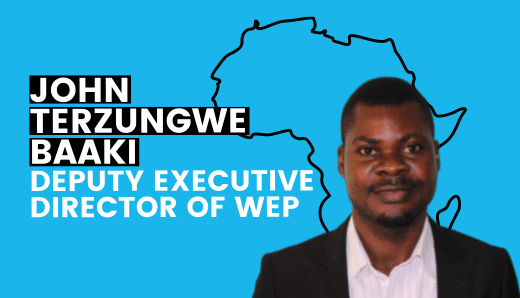“They should be left standing,” urges John Baaki about the trees of the African tropical forest. A simple statement that captures the core of the complex puzzle that is forest preservation. Why is it so important to preserve the African forests and what role do Dutch policies have to play in protecting them? Preceding the Afrikadag workshop by Women Engage for a Common Future (WECF), WECF Netherlands Director Christy Aikhorin sits down with longstanding partner John Baaki from Women Environmental Programme (WEP), to ask John all about WEP’s work on gender, climate change and forest preservation – and how they are all interconnected.
A bit of background
WECF is a nonprofit network that consists of over 150 women’s and civil society organizations in more than 50 countries working towards a gender-just and healthy planet. One of these partners is WEP. WEP was formed in Nigeria in 1997 by Priscilla Achakpa, who first mobilized women to challenge the polluting textile industries in Kaduna. Now, WEP has transitioned to be an “environmental organization that also champions issues of governance, issues of peace and security, issues of climate change,” John tells Christy. A true ecofeminist movement, with offices in Nigeria, Togo, Burkina Faso, Tunisia and Niger.
Our common work
Christy reminisces about WECF’s work with WEP, particularly their most recent joint project – an awareness raising campaign about Nigeria’s National Action Plan on Gender and Climate Change (NAPGCC). “WEP has been working with WECF for a loonnngg time”, John answers in agreement. Nigeria was one of the countries that decided to develop a national action plan based on the United Nations Framework Convention on Climate Change’s ‘Gender Action Plan’, that “encourages countries to take actions that will prevent or reduce the impact of climate change on women and also to involve them in climate change actions.” However, as John stresses; having the plan is one thing, implementing it is another. WEP brought together relevant government ministries and agencies – such as those responsible for forestry, environment and women’s issues – as well as civil society organizations in the North-Central region of Nigeria, to familiarize them with the action plan and provide recommendations for successful implementation.
Climate change & the African forests – the link
“When you talk about addressing climate change, people may propose different types of technology,” but these are often “quick fixes” or “ABCDs”, says John. In his opinion, nothing is as effective as simply letting the trees that are already capturing carbon stay put. “And that is why, in most of the work that we do around addressing climate change or mitigating the impact of climate change, or even in climate change adaptation, we advocate for preservation of forests.” Both WEP and WECF are involved in the Green Livelihoods Alliance program, ‘Forests for a Just Future’, which aims to inclusively and sustainably manage and “preserve tropical forests and landscapes to address climate change impacts” John explains. Within this project, WEP has promoted sustainable environmental practices, and particularly sustainable agricultural practices, among rural communities and civil society organizations. Besides these local actions, WEP has “pushed for policies that preserve forest landscapes”.
The role and responsibilities of Dutch policies
Dutch policies – including forest, climate, economic and foreign development policies – play a key role in preserving the African tropical forest, John argues. And not to forget, EU and international policies that the Netherlands must comply with. A telling report by BankTrack that WEP contributed to, spelled out how fossil fuel projects in Africa are funded by foreign governments, including the Dutch government. Funding for the extraction and exploration of fossil fuel is locking Africa into unsustainable economic models, as well as funding for mono-culture tree plantations such as Oil-Palm, which encourages land grabbing. “Landgrabbing is one of the drivers of deforestation in Africa”, John explains.
“The Dutch government should be mindful of the effect that policy may have on the tropical African forest”, John urges. These policies should focus on the preservation of existing Indigenous forests and promote the involvement and participation of the Indigenous peoples, in particular local women and their organizations. Providing viable alternatives for those people that are dependent on the forest for their livelihoods, is key. By doing so, forest dependent communities will no longer need to engage in activities that are harmful to their landscapes; rather, they will be able to act as key participants in preserving and sustainably managing forests. So why does Dutch forest policy need ecofeminism to best realize these goals? Come to the workshop and find out!
***
Many amazing African women’s and gender organizations are working on forest issues, including our partner “Cameroon Gender and Environment Watch” (CAMGEW), protecting the Kilum-Ijim forest area. Sevidzem Ernestine Leikeki, winner of the 2019 Gender Just Climate Solutions Award, tells you all about their efforts to strengthen female leadership and livelihoods by providing training on agroforestry, soil conservation, treeplanting, forest governance, beekeeping and the production of honey-based products, in this short video.




